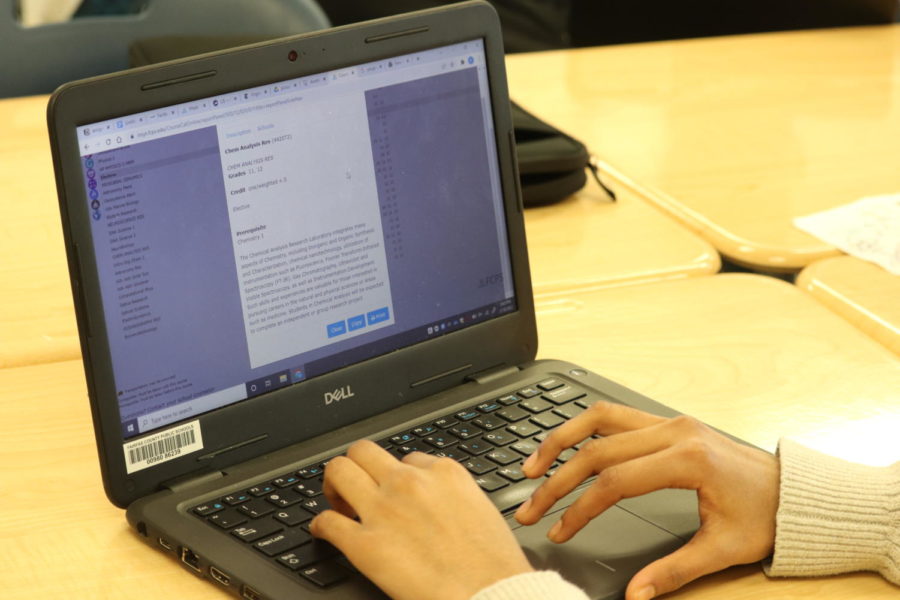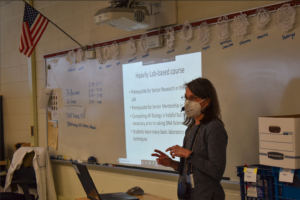Course selection dos and don’ts
A Jefferson student looks through courses, deciding what to do for the 2022-2023 school year.
February 19, 2022
Course selections are a stressful time as students begin to select classes for the next school year. The classes they choose to take can determine what senior research labs they partake in, what subjects they master, and possibly set them on a path for what they choose to be for the rest of their life.
Here are the top five tips for picking classes from counselor Sean Burke, as well as specific advice for each grade level.
1. Balance
“I think [when choosing courses] everyone should keep in mind the word balance,” Burke said. “Friends, free time, hobbies. I think it’s really easy for kids to think about next year and be like, ‘I’m really going to devote myself 100% to my coursework.’”
Balance is extremely important to both your social and academic lives, as well as mental health.
“We need balance in people’s lives,” Burke said. “You need to sleep more, drink more fluid, all that stuff. It sounds so corny sometimes, but it’s so important. There’s so much more to being a teenager than just your classes.”
2. Take advice with a grain of salt
In terms of discovering classes and figuring out what you want to take, asking upperclassmen who have been through the process before is one of the best things you can do. However, make sure to be aware that everyone’s capabilities are different. What is easy for one person to accomplish may not be easy for someone else.
“Making decisions that are best for you, and not making decisions that are based on what your friends are doing is really important,” Burke said. “Ask the right people. Find people that have similar interests and abilities.”
3. Take AP classes that interest you
Many Jefferson students feel the pressure to take as many Advancement Placement (AP) classes as possible, due to things like peer pressure or a GPA boost.
“If you’re like, ‘Okay, I gotta find more APs,’ that’s a horrible strategy,” Burke said. “And in case people have forgotten, we have the best teachers in the world who teach at a very high level. Every class is going to have its challenges. You might as well take something to interest you because that makes a challenge more bearable.”
However, if you know you enjoy that subject, knock yourself out.
“If you like what an AP class is offering, and it truly interests you, [take the course],” Burke said. “If you’ve done chemistry and you love it, do AP Chemistry.”
4. Be open to change
“You have to be willing to leave the door open for change,” Burke said. “You might take DNA 1, and just aren’t feeling it. So then do you really want to do DNA 2?”
That idea of being open to change also applies to career options.
“Some kids are like, ‘I’m doing CS,’ and then [are] like, ‘Oh, my God, I love biology,’ and then vice versa,” Burke said. “Leave the door open for change.”
5. Grade-specific tips
Rising sophomores:
“I think [rising sophomores] need to start thinking about what they’re interested in, and maybe a little bit of course planning,” Burke said. “I’m not a huge ‘four-year plan’ counselor, but they should start to think about the sequence of [their] courses junior year, and then a little bit of a peer into senior year, but also remember to explore their curiosities.”
Sophomores should also begin to think about senior research labs. While you don’t necessarily need to know exactly what you want to research, it can be helpful in picking courses that could fill prerequisites or help you explore your interests.
“Start to become familiar [with labs]. Talk to older students,” Burke said. “Hearing from seniors that are in these labs, learning a little bit about what they’re doing, helps sophomores in terms of developing their own ideas and then choosing better classes to fit what lab they’d like to go to.”
Rising juniors:
“Rising juniors should embrace the concept that junior year can be challenging,” Burke said. “I think it’s challenging from a developmental psychology perspective as they become young adults. If you have a balanced schedule and a balanced life, you can sort of weather some of those challenges. Better than if you’re overloaded.”
Also, begin to look into colleges and your future.
“Junior year can be exhausting because you’re starting to think about your future,” Burke said. “Now you’re taking some really upper-level classes, now your friends are driving, you’re driving, you’re doing more things socially. And now you’re gonna be like, ‘So college, what do you think about college?’”
Rising seniors:
“You want to enjoy senior year,” Burke said. “It’s like the last homecoming, last football game, last basketball game, last concert, last year of you working in that club.”
There are so many things students have on their plate as a senior.
“You don’t want to be bogged down with too much academics so you can’t enjoy the relationships you’ve developed with faculty, with the counselors, with the administrators, and your peers, because you’re just busy doing homework the whole time,” Burke said. “You want to give yourself room to sort of smell the roses.”








